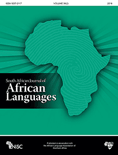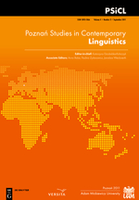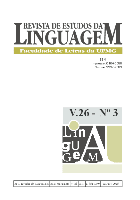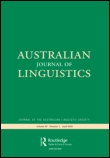
Languages
Scope & Guideline
Connecting scholars to the heartbeat of language research.
Introduction
Aims and Scopes
- Language Acquisition and Development:
Research focused on how individuals acquire and develop language skills, particularly in bilingual and multilingual contexts, examining factors like age, exposure, and educational practices. - Sociolinguistics and Language Variation:
Studies that explore the social dimensions of language, including dialectal variation, language attitudes, and the impact of social networks on language use. - Language Contact and Change:
Investigations into how languages interact and influence each other, particularly in contact situations, leading to phenomena such as code-switching, borrowing, and language evolution. - Pragmatics and Discourse Analysis:
Examination of language use in context, focusing on how meaning is constructed in interaction through discourse strategies, politeness, and implicature. - Language Policy and Education:
Research addressing the implications of language policies on education, particularly in multilingual settings, and the role of teachers and educational practices in language instruction. - Phonetics and Phonology:
Studies that analyze the sound systems of languages, including acoustic properties, speech perception, and the phonological features of different dialects. - Cognitive Linguistics and Psycholinguistics:
Exploration of the cognitive processes underlying language use and acquisition, including studies on language processing, memory, and the relationship between language and thought.
Trending and Emerging
- Multilingualism and Language Policy:
There is a growing focus on multilingualism, particularly in educational contexts, addressing how language policies affect language acquisition and identity. - Digital Communication and Language Use:
Emerging studies on digital communication, including the impact of social media and technology on language practices, are becoming increasingly significant. - Language and Identity:
Research exploring the relationship between language use and identity formation, especially in multicultural and diasporic communities, is gaining traction. - Cognitive and Affective Dimensions of Language:
An increasing interest in the cognitive and emotional aspects of language learning and use, including how these factors influence bilingualism and language processing. - Ecolinguistics and Environmental Language:
Emerging themes in ecolinguistics, focusing on the language used in environmental discourse and its implications for sustainability and ecological awareness. - Heritage Language Maintenance:
Research on the preservation and revitalization of heritage languages, particularly within immigrant communities, is on the rise, reflecting societal shifts toward valuing linguistic diversity.
Declining or Waning
- Traditional Syntax:
Research on classical syntactic theories and frameworks appears to be less prevalent, possibly due to a growing interest in more applied and interdisciplinary approaches. - Historical Linguistics:
There seems to be a diminishing number of studies focused on historical linguistics, as contemporary issues in language use and policy gain more prominence. - Prescriptive Grammar:
Research emphasizing prescriptive grammar rules and norms has waned, as linguistic diversity and descriptive approaches take precedence in recent studies. - Monolingual Language Acquisition:
There is a noticeable decline in research focusing solely on monolingual language acquisition, with an increasing emphasis on bilingual and multilingual contexts. - Formal Linguistics:
Formal approaches to linguistics, particularly those that do not engage with sociolinguistic factors, are becoming less common as the field trends toward more integrative methodologies.
Similar Journals

South African Journal of African Languages
Fostering innovative research in African linguistics and literary theory.The South African Journal of African Languages, published by Routledge Journals, Taylor & Francis Ltd, is a premier academic resource dedicated to the advancement of research in the fields of linguistics, language, and literary theory. Since its inception in 1996, this journal has been pivotal in fostering scholarly discourse around African languages, contributing significantly to our understanding of cultural and linguistic diversity across the continent. With its impressive categorization in 2023 as Q2 in Linguistics and Language and Q1 in Literature and Literary Theory, the journal attracts high-quality research and innovative perspectives, positioning itself among the leading publications in the relevant academic arenas. Researchers and students alike will find valuable insights within its pages, as it consistently ranks in the top percentiles of Scopus, notably achieving an 81st percentile in Literature and Literary Theory. The journal is committed to enhancing accessibility to research, although it currently does not offer Open Access options. Its scope includes an array of topics related to language policy, linguistic preservation, and literary critique, making it an essential resource for those engaged in the rich tapestry of African linguistics and literature.

Catalan Journal of Linguistics
Unlocking Insights into Linguistic Theory and Practice.Catalan Journal of Linguistics is a distinguished academic publication dedicated to the dynamic field of linguistics and language studies. Published by the Universitat Autònoma de Barcelona, this open-access journal has been disseminating impactful research since 2002, making significant contributions to the understanding of linguistic theory, language acquisition, and sociolinguistics, particularly within the Catalan language context. With a robust engagement in the scholarly community, it proudly holds a Q2 ranking in Linguistics and Language as of 2023, reflecting its commitment to high standards of research and innovation. The journal is accessible to a global audience, promoting the free exchange of knowledge beyond geographical boundaries, and serves as an essential platform for researchers, professionals, and students aiming to stay at the forefront of linguistic inquiry. With its rich archive of articles, the Catalan Journal of Linguistics stands as a vital resource for anyone keen to explore contemporary linguistic issues and advancements.

Poznan Studies in Contemporary Linguistics
Fostering scholarly discourse in language research.Poznan Studies in Contemporary Linguistics, published by DE GRUYTER MOUTON, is a pivotal journal in the field of linguistics, with an ISSN of 0137-2459 and an E-ISSN of 1897-7499. Located in Germany, this esteemed journal has consistently contributed to the academic landscape since its inception. As of 2023, it holds a Q2 category rank in Linguistics and Language and boasts commendable Scopus rankings, featuring in the 69th percentile for Arts and Humanities and the 66th percentile for Social Sciences. The journal emerges as a vital platform for scholars to explore contemporary linguistic theories and practices, making it an essential resource for researchers, professionals, and students alike. With a converged publication period from 2007 to 2024, it aims to facilitate a deeper understanding of linguistic advancements and trends. While the journal currently does not offer open access, its rigorous peer-review process ensures the highest quality of published research, strengthening its role as a leading discourse in the dynamic field of linguistics.

Rivista di Psicolinguistica Applicata-Journal of Applied Psycholinguistics
Transforming Understanding of Human Interaction.Rivista di Psicolinguistica Applicata - Journal of Applied Psycholinguistics is a distinguished journal dedicated to exploring the intersections of psychology and linguistics, making significant contributions across various subfields of psycholinguistics and its applications. Published by Fabrizio Serra Editore in Italy, this journal presents a repository of innovative research, theoretical advancements, and practical applications relevant to developmental and educational psychology, linguistics, and social psychology. Although currently listed in Q4 for Developmental and Educational Psychology and Q4 for Social Psychology, the journal has achieved a respectable Q3 ranking in Linguistics and Language, reflecting its commitment to enhancing understanding within these realms. With an E-ISSN of 1724-0646, the journal facilitates accessibility to its content, empowering scholars and practitioners to stay abreast of emerging trends and findings. The impact factor of the journal is poised for growth as it seeks to amplify its reach and influence within the academic community, appealing to researchers, professionals, and students who have a vested interest in the dynamic field of applied psycholinguistics.

Revista de Estudos da Linguagem
Connecting Scholars in the World of LinguisticsRevista de Estudos da Linguagem, an esteemed academic journal published by the Universidade Federal de Minas Gerais within its Faculty of Letters, serves as a vital resource for scholars in the fields of linguistics and education. Since its inception in 1992, the journal has embraced an open access model, ensuring that research is accessible to a broader audience, thereby fostering collaboration and knowledge dissemination. Based in Brazil, this journal focuses on a wide array of topics related to language studies, contributing significantly to the discourse within the linguistics community. While recent rankings place it in Q4 in Education and Q3 in Linguistics and Language categories, its dedication to publishing high-quality research continues to attract attention despite its current Scopus rankings. The journal notably ranks at #668 in Language and Linguistics, verifying its emerging impact in the academic landscape. Researchers and students alike will find the journal's commitment to diversity in linguistic research a compelling reason to engage with its articles. The journal's offices are located at AV ANTONIO CARLOS, 6627 PAMPULHA, BELO HORIZONTE, MG, BRAZIL, and it continues to invite contributions that challenge established norms and explore innovative themes within the dynamic realm of language studies.

Functions of Language
Innovating Understanding in Linguistics and Language StudiesFunctions of Language, published by John Benjamins Publishing Co, serves as a vital platform for scholars and practitioners in the fields of linguistics and language studies. With its ISSN 0929-998X and E-ISSN 1569-9765, this esteemed journal, based in the Netherlands, has solidified its reputation through a focused dedication to exploring the multifaceted roles that language plays across various contexts. Ranked in the top percentile of leading journals in Linguistics and Language (Q2 category, 2023) and holding impressive Scopus ranks within both the Arts and Humanities and Social Sciences sectors, the journal emphasizes research that interlinks theoretical insights with practical implications. Functions of Language aims to advance our understanding of linguistic structures and their applications, making it an essential resource for researchers, professionals, and students alike who are eager to contribute to the evolving discourse in language studies. With content converging from 1994 to 2024, the journal reflects ongoing scholarly engagement and innovation in the field.

Language and Linguistics Compass
Navigating the Complexities of Language and CommunicationLanguage and Linguistics Compass, published by Wiley, stands as a premier journal in the field of linguistics, showcasing innovative and interdisciplinary research. With its ISSN 1749-818X and E-ISSN matching, the journal has built a robust reputation, achieving an impressive Q1 ranking within the linguistics category for 2023, placing it in the top 4% of its field. Its Scopus rank of 48 out of 1167 highlights its influence and significance among linguistics journals, boasting a commendable 95th percentile. This journal serves as a vital resource for researchers, professionals, and students, offering a wide range of accessible articles that illuminate current trends and advances within the domain of language studies. Although it is not Open Access, the journal is committed to quality and diversity in its publications, ensuring scholarly articles from various sub-disciplines of linguistics are represented from 2008 through 2024. Located in the United Kingdom, Language and Linguistics Compass invites contributions from around the globe, reinforcing its status as a leading forum for linguistic discourse.

Australian Journal of Linguistics
Championing Quality Research in LinguisticsThe Australian Journal of Linguistics, published by Routledge Journals, Taylor & Francis Ltd, stands as a distinguished platform in the field of linguistics, fostering rigorous academic discourse since its inception in 1981. With an ISSN of 0726-8602 and an E-ISSN of 1469-2996, the journal has achieved a notable Q2 ranking in the linguistics and language category for 2023, indicating its quality and relevance within the academic community. With a Scopus ranking of #316 in Arts & Humanities and #373 in Social Sciences, it sits in the 71st and 68th percentiles respectively, underscoring its impact in the fields it encompasses. The journal aims to publish high-quality research articles that contribute to the understanding of linguistic theory, sociolinguistics, and applied linguistics, making it an essential resource for researchers, professionals, and students alike. The journal is based in the United Kingdom, at 2-4 Park Square, Milton Park, Abingdon OX14 4RN, Oxon, England, and actively encourages contributions that can expand the current linguistic discourse, reinforcing its commitment to highlighting diverse perspectives in language research.

Annual Review of Linguistics
Unveiling Trends and Theories in LinguisticsAnnual Review of Linguistics is a premier scholarly journal dedicated to advancing the field of linguistics through comprehensive and insightful reviews of current research and emerging trends. Published by ANNUAL REVIEWS, this journal is recognized for its high impact, evidenced by its Q1 ranking in the Linguistics and Language category and exceptional placements in the Scopus Ranks, positioning it in the top 2% of its field. Since its inception in 2015, the journal has served as a vital resource for researchers, professionals, and students seeking to deepen their understanding of language theories, acquisition, processing, and sociolinguistics. With no Open Access currently available, the Annual Review of Linguistics is esteemed for its rigorous peer-reviewed articles that synthesize a wealth of knowledge, making it an indispensable tool for advancing research and dialogue within the linguistic community.

NEUPHILOLOGISCHE MITTEILUNGEN
Unraveling Linguistic Trends from a European PerspectiveNEUPHILOLOGISCHE MITTEILUNGEN, published by the esteemed Modern Language Society, stands as a significant contribution to the domain of Language and Linguistics. With a history dating back to 1971, this journal has consistently provided an academic platform for researchers and scholars, navigating through the intricacies of philology and linguistic studies. Although it is indexed in Scopus with rankings reflecting its position in the Arts and Humanities and Social Sciences categories, it currently does not offer Open Access, which may require interested parties to seek institutional access for its wealth of content. The journal has experienced periods of coverage discontinuation in recent years, yet it remains a valued source for advancing the understanding of language theories and linguistic practices. Its location in Helsinki, Finland, offers a unique European perspective on global linguistic issues. The journal is ideal for those looking to engage with evolving linguistic trends and contribute to contemporary discussions in the field.